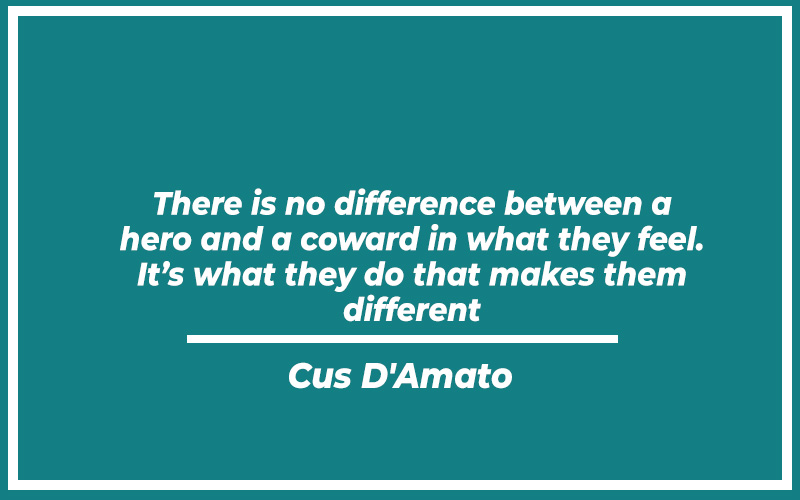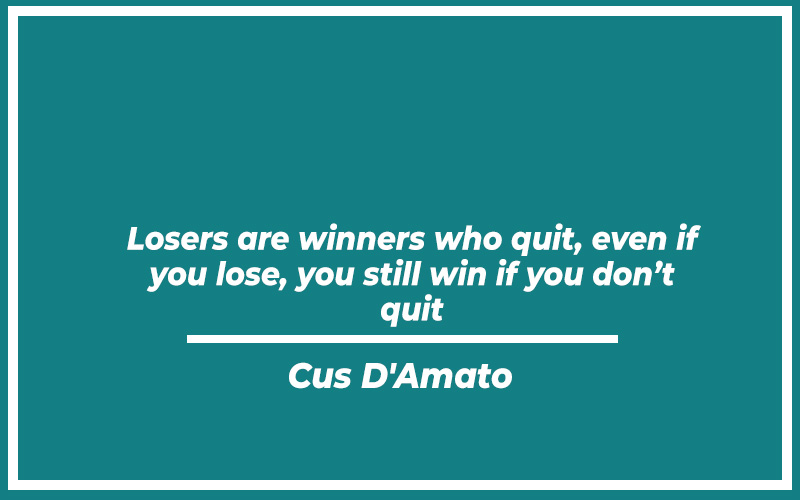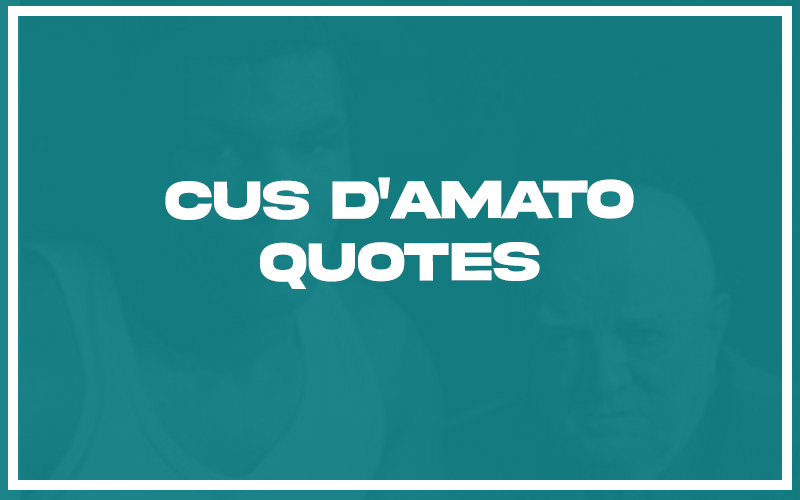If you’re interested in the mental aspects of sports, especially boxing, then the words of Cus D’Amato will strike a powerful chord with you.
As the legendary boxing trainer of champions like Mike Tyson, D’Amato wasn’t just about physical training; he focused profoundly on the psychological preparation of his fighters.
His quotes are brimming with wisdom on fear, discipline, and the making of a champion. As you explore Cus D’Amato’s quotes, you’ll find motivational insights that apply not only to boxing but to overcoming any of life’s challenges.
Best Cus D’Amato’s Quotes

“There is no difference between a hero and a coward in what they feel. It’s what they do that makes them different.” – Cus D’Amato
Cus D’Amato’s observation highlights that heroes and cowards experience the same fear; their actions in response to that fear set them apart. This quote underscores the importance of choice and action in defining one’s character. It emphasizes that bravery isn’t the absence of fear but rather the decision to confront and act despite it.
This perspective is empowering as it suggests that everyone has the potential to be a hero through their actions, providing a powerful lesson on personal courage and integrity.
Also Read: Freaky Quotes (with Explanations)
“The hero and the coward both feel exactly the same fear. Heroes just react to it differently.” – Cus D’Amato
Echoing a similar sentiment, this quote delves deeper into the psychological battle between action and inaction in the face of fear. D’Amato articulates that the distinction lies in the response to fear, not the experience of it.
This quote serves as a motivational call to confront fear with proactive responses, reinforcing the idea that true courage involves choosing how to handle fear constructively and bravely. It’s a reminder that everyone faces fear, but heroes choose to overcome it.
“When you get hit that’s when you’ve got to be calm. A professional fighter has to learn how to hit and not get hit, and at the same time be exciting.” – Cus D’Amato
This advice from D’Amato stresses the importance of composure and strategic thinking in boxing. The ability to remain calm when under attack and to counter effectively while maintaining an engaging style is crucial for success in the ring.
This philosophy can be applied beyond sports, teaching the value of staying composed and thoughtful under pressure in any challenging situation, enhancing both personal and professional life.
“If you can hit your opponent with two punches, you don’t hit him with one. Get off with some bad intentions in there. Believe in yourself.” – Cus D’Amato
D’Amato’s quote emphasizes aggression and self-belief in competitive situations. He advocates for taking full advantage of opportunities and executing with confidence. The underlying message is about the power of self-confidence and the importance of asserting oneself fully when conditions are favorable.
This teaches a broader lesson on commitment and the importance of self-trust in achieving personal goals.
“Emotions, particularly anger, are like fire. They can cook your food and keep you warm, or they can burn your house down.” – Cus D’Amato
D’Amato compares emotions to fire to highlight their potential benefits and dangers. This analogy illustrates the dual nature of emotions, which can be constructive when controlled and destructive when unchecked.
The quote serves as a caution about the management of emotions, particularly anger, emphasizing the need for emotional intelligence and control in using one’s emotional energy positively.
“There are very few new things in this world, very few. That’s why people that are young, if they’re smart, try to profit from the experience of an older guy so they won’t have to go through all the pain and suffering.” – Cus D’Amato
D’Amato points out the value of learning from the experiences of others to avoid unnecessary hardships. This quote encourages mentorship and the wisdom of drawing on the knowledge of those who have already navigated similar paths.
It highlights the importance of historical awareness and learning from the past to make smarter decisions in the present.
“Every fighter that ever lived had fear. A boy comes to me and tells me that he’s not afraid, if I believed him I’d say he’s a liar or there’s something wrong with him.” – Cus D’Amato
In this quote, D’Amato acknowledges that fear is a universal experience, even for fighters. He dismisses the notion that true bravery comes from a lack of fear, instead suggesting that acknowledging and managing fear is normal and healthy.
This statement advocates for honesty about one’s emotions and reinforces that facing fear is a part of the human experience, essential for growth and resilience.
“Losers are winners who quit. Even if you lose, you still win if you don’t quit.” – Cus D’Amato
Cus D’Amato’s quote emphasizes the importance of perseverance in the face of defeat. By defining losers not as those who fail but as those who give up, he shifts the focus from the outcome to the process.
This perspective encourages continuous effort and resilience, underscoring the idea that true failure is not found in loss, but in the abandonment of pursuit. It’s a motivational call to maintain commitment and effort, regardless of challenges or setbacks, reinforcing the value of persistence in achieving long-term goals.
“A boy comes to me with a spark of interest, I feed the spark, and it becomes a flame. I feed the flame, and it becomes a fire. I feed the fire, and it becomes a roaring blaze.” – Cus D’Amato
This metaphorical quote from Cus D’Amato illustrates his approach to nurturing talent and dedication in young athletes. He emphasizes the potential within each individual, which can be developed from a mere spark to a roaring blaze through guidance and support.
This philosophy underlines the transformative power of mentorship and the significant impact that encouragement and sustained support can have on someone’s growth and success. It’s a powerful reminder of the role mentors play in turning potential into excellence.
“A professional fighter has got to learn to hit and not get hit, and at the same time be exciting.” – Cus D’Amato
D’Amato highlights the complex balance required in boxing—defensive skill, offensive prowess, and entertainment value. This quote captures the essence of the sport, where success depends not only on one’s ability to compete effectively but also to engage and captivate an audience.
It speaks to the broader challenge of excelling in any competitive field: mastering the technical skills while also considering the spectators’ expectations.
“When two men step into the ring, one and only one deserves to win. When you step into the ring, you gotta know you deserve to win. You gotta know destiny owes you victory, because you trained harder than your opponent. You sparred harder. You ran farther.” – Cus D’Amato
This quote encapsulates D’Amato’s philosophy on preparation and self-belief in competition. It stresses the importance of hard work and preparation as the basis for deserving victory.
D’Amato believed that a fighter’s confidence should be built on a foundation of rigorous training and dedication, asserting that success is owed not to luck but to superior preparation and effort.
“Boxing is entertainment, so to be successful a fighter must not only win but he must win in an exciting manner. He must throw punches with bad intentions.” – Cus D’Amato
D’Amato’s statement reflects his understanding of boxing as both a sport and a spectacle. He underscores the necessity for fighters to be not just competent but also compelling to watch.
This quote speaks to the dual demands placed on professional athletes: to achieve and to entertain, highlighting the importance of aggressiveness and intensity in captivating audiences and securing success in the ring.
“The punch that knocks a man out is the punch that he doesn’t see.” – Cus D’Amato
This quote speaks to the strategy and stealth required in boxing, emphasizing the effectiveness of surprise and unpredictability. D’Amato points out that the most impactful strikes are those that the opponent does not anticipate, offering a broader lesson on the element of surprise in overcoming challenges.
It’s a tactical reminder of the power of unexpected moves, both in and out of the sports arena.
“Whatever a person does in the end is what he intended to do all along.” – Cus D’Amato
D’Amato’s observation about intentions and outcomes suggests that actions ultimately reflect true intentions, regardless of stated motives or excuses. This quote challenges individuals to be honest about their goals and consistent in their efforts, proposing that one’s true character is revealed through their actions.
It serves as a call to personal accountability and integrity, emphasizing the importance of aligning actions with one’s professed values and intentions.
“Losers are winners who quit…even if you lose…you still win…if you don’t quit.” – Cus D’Amato
Cus D’Amato’s philosophy emphasizes perseverance as the true measure of a winner. He asserts that continuing to strive and fight despite setbacks is more significant than the immediate outcome of any single challenge.
This mindset encourages resilience and a long-term perspective on success and failure, suggesting that persistence itself is a form of victory. D’Amato’s perspective is motivational, urging individuals to view each effort as a win, fostering a mindset that values continuous effort and the learning that comes from not giving up.
“There is no such thing as a natural puncher. There is a natural aptitude for punching and that is different. Nobody is born the best. You have to practice and train to become the best.” – Cus D’Amato
Cus D’Amato challenges the myth of innate talent, emphasizing the importance of hard work and persistent training. By distinguishing between natural aptitude and skill development, he encourages a growth mindset, asserting that dedication and disciplined practice are what lead to excellence.
This quote motivates individuals to invest in their development and not rely solely on natural gifts, promoting a proactive approach to achieving personal and professional mastery.
“Fear is the greatest obstacle to learning. But fear is your best friend. If you learn to control it, you let it work for you. If you don’t learn to control it, it’ll destroy you and everything around you.” – Cus D’Amato
D’Amato’s insight into fear as both an obstacle and an ally highlights the dual role emotions play in personal growth. He suggests that mastering fear can transform it into a motivating force rather than a barrier.
This approach encourages embracing and managing fear to harness its energy positively, offering a strategy for personal empowerment and resilience. The quote serves as a powerful reminder of the potential benefits of emotional intelligence in overcoming life’s challenges.
“A boy comes to me with a spark of interest. I feed the spark and it becomes a flame. I feed the flame and it becomes a fire. I feed the fire and it becomes a roaring blaze.” – Cus D’Amato
This metaphor illustrates D’Amato’s philosophy of mentorship and potential development. He describes his nurturing approach to coaching, which amplifies a small interest into a powerful passion and skill set.
This quote underscores the impact of supportive and attentive mentorship, which can transform potential into greatness. It reflects the importance of encouragement and sustained effort in cultivating talent, inspiring mentors and leaders to actively foster growth in others.
“Boxing is entertainment, so to be successful a fighter must not only win but he must win in an exciting manner. He must throw punches with bad intentions.” – Cus D’Amato
D’Amato acknowledges the entertainment aspect of boxing, emphasizing the need for fighters to be not only technically proficient but also engaging to watch. This quote highlights the balance between performance and strategy, underscoring the importance of intent and vigor in captivating an audience.
His perspective encourages athletes to consider their spectators, aiming to deliver performances that are both effective and thrilling, thus enhancing their appeal and success in the competitive world of sports.
“No matter what anyone says, no matter the excuse or explanation, whatever a person does in the end is what he intended to do all along.” – Cus D’Amato
D’Amato’s quote on intentions versus actions calls for authenticity and integrity, emphasizing that actions ultimately reflect true intentions. This perspective encourages individuals to act with deliberate purpose and to be accountable for their outcomes.
It challenges people to align their actions with their stated goals, promoting a congruent and principled approach to personal and professional endeavors.
“The hero and the coward both feel the same thing, but the hero uses his fear, projects it onto his opponent, while the coward runs. It’s the same thing, fear, but it’s what you do with it that matters.” – Cus D’Amato
D’Amato reiterates that fear is a universal emotion experienced by both the brave and the fearful, but the key difference lies in the response to that fear. He advocates using fear as a tool to gain a psychological advantage, transforming it into a source of strength.
This quote inspires courage and proactive behavior, encouraging individuals to face their fears and use them constructively to overcome obstacles, rather than allowing fear to dictate their actions.
“Losers are winners who quit…even if you lose…you still win…if you don’t quit.” – Cus D’Amato
Cus D’Amato’s words emphasize resilience and the idea that true defeat only comes from giving up. His philosophy promotes persistence as essential to success, suggesting that enduring through failures without surrendering keeps you in the realm of winners.
This mindset serves as a motivational reminder that the journey and effort are just as important as the outcome, encouraging a steadfast approach to both personal and professional challenges.
“The fighter that’s gone into the ring and hasn’t experienced fear is either a liar or a psychopath.” – Cus D’Amato
D’Amato starkly addresses the inevitability of fear in competitive scenarios, underscoring that feeling fear is a normal, healthy response. By stating this, he demystifies the notion of fearlessness and promotes an understanding that managing fear is crucial, rather than denying its existence.
This quote inspires acceptance and mastery of fear as integral to the preparation and mindset of a fighter—or anyone facing high-pressure situations.
“Remember, it’s always good to throw the punch where you can hit him and he can’t hit you. That’s what the science of Boxing is all about.” – Cus D’Amato
This tactical advice from D’Amato highlights the strategic essence of boxing, emphasizing the importance of intelligence and foresight in the ring. It serves as a metaphor for strategic thinking in life—maximizing impact while minimizing risks.
His focus on smart, strategic engagement teaches the value of planning and precision in achieving success.
“No matter what anyone says, no matter the excuse or explanation, whatever a person does in the end is what he intended to do all along.” – Cus D’Amato
D’Amato’s observation about intentions versus actions calls for authenticity and personal accountability. He stresses that true intentions are ultimately revealed through actions, regardless of prior claims or excuses.
This perspective encourages individuals to be sincere and consistent in their endeavors, aligning their actions with their stated goals and values.
“Greatness is not a measure of how great you are but how great others came to be because of you.” – Cus D’Amato
D’Amato defines greatness in terms of the positive impact one has on others, shifting the focus from self-centered achievement to the influence one has on enabling others to achieve.
This altruistic view of success encourages mentorship, leadership, and a legacy defined by uplifting others, promoting a broader, more inclusive view of personal and professional accomplishment.
“Boxing is entertainment, so to be successful a fighter must not only win but he must win in an exciting manner. He must throw punches with bad intentions.” – Cus D’Amato
In this quote, D’Amato speaks to the dual demands on professional athletes, especially boxers, to achieve and entertain.
He emphasizes that success in the ring involves not just technical skill but also the ability to captivate and thrill an audience, enhancing the sport’s appeal and the athlete’s career longevity.

“Losers are winners who quit, even if you lose, you still win if you don’t quit.” – Cus D’Amato
Reiterating his philosophy on perseverance, D’Amato encourages a relentless pursuit of goals. He advocates for a mindset where persistent effort and refusal to give up, even in the face of repeated setbacks, are viewed as victories in themselves.
This approach fosters resilience and a positive outlook towards challenges, emphasizing endurance as a key component of success.
Also Read: Top Bad Bitch Quotes (with Explanation)
Final Thoughts
Cus D’Amato’s philosophy extended well beyond the boxing ring. His quotes often serve as a guide for facing life’s battles with courage and determination.
As you reflect on his teachings, let them empower you to confront your fears and push beyond your limits.
Remember, according to D’Amato, the key to success isn’t just talent or skill, but the ability to handle fear and maintain self-discipline. Carry his wisdom into your daily challenges, and you might find yourself stronger and more resilient in the face of adversity.

